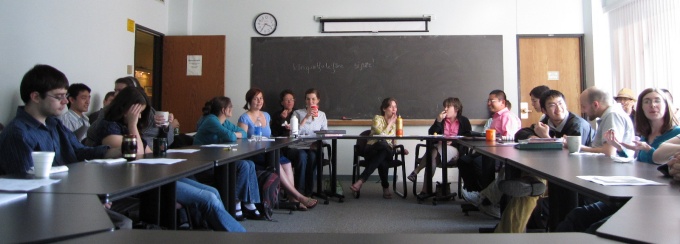Graduate Overview

Graduate linguistics students meet on North Campus
Graduate Teaching Mission
The overall mission of the Department of Linguistics graduate programs is to train students to succeed in careers related to the descriptive and theoretical study of language in academia, government or industry. To help students achieve their professional goals, the department provides training in all aspects of linguistic research, as well as a comprehensive grounding in the properties of languages, research methodologies, contemporary linguistic theories, and skills such as academic writing and the effective dissemination of research results.
The Department of Linguistics recognizes that it operates on the territory of the Seneca Nation, a member of the Haudenosaunee/Six Nations Confederacy. Because of this, it places a special priority on supporting research on Haudenosaunee languages that is in line with its overall mission and, in particular, research led by members of the Haudenosaunee nations.
Degree Options
The Linguistics PhD program will not be accepting students for Fall 2026. We expect to resume our normal recruitment of PhD students for Fall 2027.
A Cross-Disciplinary Approach
Our graduate courses focus on breadth and empirical/experimental methodologies. Students receive training in traditional disciplines, such as syntax, semantics, pragmatics, phonetics, and phonology, in addition to substantial training in other areas, such as language typology, psycholinguistics, computational linguistics, and historical and contact linguistics. All students are required to take at least two semesters of Methods classes that include courses in Field Methods, Quantitative Methods and Statistics, Corpus Linguistics, and Computational Linguistics.
We encourage our students to explore interdisciplinary research within the Center for Cognitive Science, and many of our students receive extensive training in Cognitive Science through collaborations with the Department of Psychology or Computer Science and Engineering programs.
Welcoming Diversity
In recent years, sixty students have graduated with Linguistics Master's and Doctoral degrees. Of these, roughly half the population joined us from overseas, including students from Asia, Latin America, Africa and Europe. We believe a diverse student body contributes to a wide range of perspectives and lively cross-cultural exchange, both of which serve to strengthen our department and our discipline.
Graduate Linguistics Association
Graduate students in the Linguistics Department are automatically members of the Graduate Linguistics Association. The GLA coordinates events (both academic and social), assists students with disputes against faculty, and tries to better our department through constant dedication to helping fellow students.
Learn More About Linguistics
Before applying, we invite you to learn more about our degree requirements:

